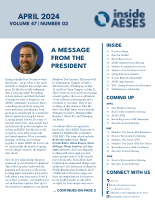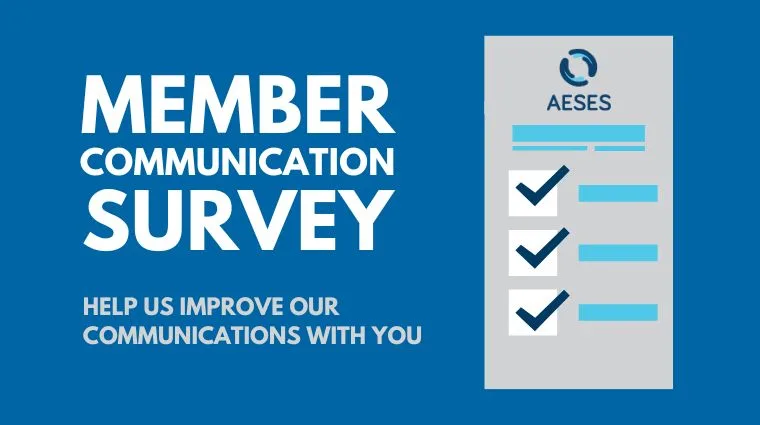Archive for the ‘member emails’ Category
No foolin’, it’s April! Read the newest issue of insideAESES!
Monday, April 1st, 2024
 No foolin’, it’s April! Along with the change in the month, here’s the newest issue of insideAESES!
No foolin’, it’s April! Along with the change in the month, here’s the newest issue of insideAESES!
Grab a chocolate Easter egg and take a few moments to read this issue, which includes:
- A message from AESES president Chris McCann
- Cosmic Bingo Bowling Night recap
- Questions about time-off entitlements for dealing with a family member’s death
- A notice about the Member Communication Survey
- Annual General Meeting details
- Details about joining the UM Retirees Association
- Information about the UM Employees Scholarship
- Ongoing union and member grievances
Upcoming AESES AGM – April 9
Tuesday, March 19th, 2024
 We invite all our signed* union members to attend the 51st AESES Annual General Meeting on Tuesday, April 9, 2024. The meeting will take place via videoconference using Zoom at 7:00 pm.
We invite all our signed* union members to attend the 51st AESES Annual General Meeting on Tuesday, April 9, 2024. The meeting will take place via videoconference using Zoom at 7:00 pm.
The AGM allows our executive team and committee chairs to review AESES financials with attendees, speak about the union’s activities, explain how our programs can benefit our membership, and preside over a question period.
Join us on April 9 to meet the people behind the decision-making process for spending your union dues and learn more about our programs and services. There will also be time for asking questions.
Special guest, the Honourable Renée Cable, Minister of Advanced Education and Training, will bring greetings from the Provincial government before our meeting.
Please visit our event page to learn more and to register for the AGM.
*Please note that only signed AESES members are permitted to participate in the AGM and vote on arising issues.
Help Shape the Future of AESES Member Communications
Friday, March 15th, 2024
AESES is looking to improve their communications with members. To help us do this, we need to know more about you, our members. Your feedback is valuable to ensure we use the most effective channels to engage with you. As a thank you, after submitting the survey, you have the option to enter a draw for a chance to win an AESES-branded laptop backpack.
A link to a survey was sent to members on March 15. If you didn’t receive it, please send an email to jpothe@aeses.ca to request it. The survey closes on April 15, 2024.
Thanks for your help in shaping the future of AESES member communications!
Upcoming Brown Bag Sessions
Monday, February 26th, 2024
 Join us for a general discussion on issues and concerns faced by members, including clarification of collective agreement articles, your rights and the responsibilities of your employer. This is your opportunity to meet the AESES Labour Team and your Board Reps, and to have your union-related questions answered. Feel free to bring your lunch. Registration is required.
Join us for a general discussion on issues and concerns faced by members, including clarification of collective agreement articles, your rights and the responsibilities of your employer. This is your opportunity to meet the AESES Labour Team and your Board Reps, and to have your union-related questions answered. Feel free to bring your lunch. Registration is required.
Can You Tell Me? Can Work Hours Be Modified?
Sunday, December 10th, 2023
The concept of a 4-day workweek or having every second Monday off is an appealing idea for many. From time to time, an AESES employee may need or want to adjust their hours of work temporarily or permanently. There is language in the AESES Collective Agreements that allows members to request a modified work schedule.
Members at both UM and UW can request a modified work schedule. It is important to note that while the language in both the AESES-UM and AESES-UW Collective Agreements allows employees to make such a request, approval is not guaranteed. The employer must consider the feasibility of the request by examining particulars such as the type of work the employee does, the Department’s hours of operation, staffing levels and current workloads. If the request is approved on a temporary or permanent basis, it is also important to note that the employer can still amend or cancel the arrangement if they deem it necessary.
As covered in Article 11.2 of the AESES-UW Collective Agreement, UW members can submit a request for a modified work week in writing to their supervisor. When making the request, you should be aware that a modified work week may include but is not limited to, flextime, banked time, or a compressed work week. The employer will consider the request and provide a written response in a reasonable period. If approval is granted by the Employer for a modified work week, the terms and conditions of the modified work week are confirmed in a Letter of Understanding (LOU).
The process is similar for UM members, as outlined in Articles 11.1 and 12.8 of the AESES-UM Collective Agreement. When a recurring exchange of work for time off exceeds one pay period, it is considered a modified work schedule. UM members can submit a request for a modified work schedule to their supervisor. If granted after due consideration by the employer, the terms and conditions of the modified work schedule shall be confirmed by a LOU signed by the Department, Human Resources, the employee(s), and the Association.
If you need assistance with a modified work schedule request, contact us at LabourTeam@aeses.ca.
For info on short-term or one-time schedule change requests, referred to as the Banking of Regular Time, see the Can You Tell Me article in the August 2024 insideAESES newsletter.
2025 Proposed Budget
Sunday, December 10th, 2023
Below is the AESES Finance Committee’s proposed budget for 2025. These estimates are subject to approval by the Board of Representatives at their meeting on December 10, 2024.
| PROPOSED BUDGET ESTIMATES FOR YEAR 2025 | |||
| YTD | BUDGET | ESTIMATES | |
| as of Sept. 30 | 2024 | 2025 | |
| INCOME: | |||
| Dues – U of Manitoba | $1,031,699.03 | $1,338,642 | $1,428,903 |
| Dues – U of Winnipeg | $198,722.13 | $238,945 | $261,320 |
| Dues – St. Andrew’s College | $1,095.01 | $1,441 | $1,528 |
| TOTAL INCOME | $1,231,516.17 | $1,579,028 | $1,691,751 |
| EXPENSES: | |||
| MEMBERS’ SERVICES | |||
| Activities | $36,223.32 | $49,800 | $54,800 |
| Diversity | $- | $2,500 | $2,500 |
| Health & Safety | $- | $- | $2,500 |
| Public relations | $10,882.00 | $23,725 | $20,925 |
| Remuneration | $19,370.75 | $24,240 | $41,675 |
| CCU Affiliation | $52,987.70 | $65,862 | $78,279 |
| Members’ education | $14,346.67 | $33,000 | $30,000 |
| Printing | $- | $1,000 | $2,000 |
| Meeting expenses | $4,073.55 | $3,700 | $14,550 |
| Professional fees | $58,115.88 | $210,500 | $195,500 |
| Special projects | $3,412.50 | $- | $5,500 |
| $199,412.37 | $414,327 | $448,229 | |
| PERSONNEL | |||
| President – salary & benefits | $57,905.68 | $82,835 | $96,269 |
| Staff – salaries & benefits/education | $565,223.83 | $769,077 | $807,749 |
| $623,129.51 | $851,912 | $904,018 | |
| OFFICE OPERATING | |||
| Equipment services | $1,691.98 | $2,750 | $3,050 |
| Office expenses | $11,040.63 | $17,550 | $17,750 |
| Premises | $80,014.53 | $110,000 | $109,000 |
| Professional fees | $22,648.54 | $23,900 | $27,000 |
| Communications | $7,504.98 | $12,500 | $11,000 |
| $122,900.66 | $166,700 | $167,800 | |
| TOTAL EXPENSES | $945,442.54 | $1,432,940 | $1,520,047 |
| OPERATING INCOME (LOSS) FOR PERIOD | $286,073.63 | $146,088 | $171,704 |
| ADDITIONS TO FURNITURE & COMPUTERS | $7,985.77 | $10,000 | $4,000 |
| NET INCOME (LOSS) FOR PERIOD | $278,087.86 | $136,088 | $167,704 |
President’s Message – December 2024
Sunday, December 10th, 2023

Season’s greetings and happy holidays AESES folk!
As the old Andy Williams song proclaims, “It’s the most wonderful time of the year.” For many of us, this is true. It’s a time to reconnect with family and friends, to reflect on the year gone by, and to look forward with anticipation to the year ahead. This is a time to remember what is important to us in life. Family. Friends. Faith. Some of us will have different definitions of what these words mean to us, but in many ways, despite these differences, the fact that we all share in cherishing these values makes us more alike than most would think.
Things have been quite busy here at the AESES office, as well. In addition to the excellent advocacy and representative work the staff do, AESES held its annual children’s holiday party on December 1, this year renamed the Children’s Winter Holiday Extravaganza! With over 250 children and their families, it was a packed house with smiles all around. Brian Glow, International Illusionist and Comedy Magician entertained the crowd with mind-numbing illusions and amazing tricks with audience participation. And of course, Santa also stopped by for a visit. A huge thank you to the members of the Activities Committee and to those who volunteered and helped make the day possible!
Our Labour Team has also been busy with The University of Winnipeg Negotiations Committee, meeting regularly in preparation for the imminent bargaining. Stay tuned for more updates as they become available.
With the winter break fast approaching, I sincerely hope that everyone enjoys this very well-deserved break and all that comes with it, be it travelling home, visiting with family and friends, or just sleeping in to rest and recharge. But let’s not forget those who are less fortunate than us. The holidays can be a trying time for many, with some feeling lonely, stressed, and anxious.
If you find the holidays a rough time for any reason, please know that there are resources available to members and their families to help with the feelings of anxiety, stress, and isolation. You can find a list of wellness resources on our website and please don’t be afraid to access them.
To all, from all of us here at AESES,
please have a very safe and happy holiday season!
Respectfully and In Solidarity,

Rob
P.S. Hardly an afterthought, but we at AESES would all like to acknowledge the profound contribution Executive Director Lisa McKendry has made to AESES in her 20 years of employment with the organization and wish her much luck, love, and happiness in her well-earned retirement. Thank You, Lisa!
Extra, Extra: insideAESES Newsletter (December 2023)
Tuesday, December 5th, 2023
Welcome to December! Yes, that’s correct, December. While it doesn’t look like December with the lack of snow, it does signify the last insideAESES issue of the year.
Before you continue your holiday shopping/baking/celebrating grab an egg-nog-filled Moose Mug and take a few moments to read about:
- A message from AESES president Chris McCann
- Invitation to the AESES Holiday Open House – December 15, 3:00 – 6:00 pm
- Photos from the Children’s Christmas Party
- The Rogers Sugar Strike
- The final 50 for 50 Contest Winners
- New AESES appointments
- 2024 AESES Draft Budget
- Family Care Resources and more
View the December issue and previous ones here.
Happy holidays, and see you at our Open House on December 15th!
Email to AESES-UM Members – UM Pension Plan Change
Tuesday, November 14th, 2023
November 14, 2023
To: All AESES-UM Members
By now, you should have received an email from the University advising of an upcoming change to the UM Pension Plan (1993), if you did not see it in your email Friday, check your Junk Mail folder. The email laid out the reason why this necessary change is required and advised employees that there will be no diminishment of their pension entitlement. AESES has been directly involved in the discussions and wants to assure our members that this is indeed the case.
In 2019, the University notified AESES and the other union and retiree stakeholders at the UM Staff Benefits Committee that it was necessary to make changes to the “1993 Pension Plan” to ensure it remained compliant with Canada Revenue Agency (CRA) rules, and to ensure that retirement annuities could continue to be funded on a long-term basis. This “1993 Pension Plan” is the one that all current members participate in, even if you were just hired. After several special meetings of the Staff Benefits Committee in 2019 and 2020, AESES partnered with UMFA. Together we retained our own external legal and actuarial professionals to ensure the CRA required changes were necessary and implemented properly. While we recognized to come into compliance with CRA rules that changes were necessary, we wanted to ensure the preservation of our members’ existing pension benefits. The counsel we retained engaged with the University’s pension plan administrators and not only protected our interests but was integral to devising a solution that maintained the flexibility and benefits of our pension with guarantees members would see no diminishment of benefit.
Following our recent Staff Benefits Committee meeting on Monday, November 6, the committee has now recommended that the proposed changes we helped craft be accepted and they have now been referred to the Board of Governors for approval. The plan amendments are expected to be implemented in 2024.
The University has provided contact information for the Pension Office should you have any questions about the plan change. However, if you would like to speak with someone from the AESES Business Office regarding this, contact our Labour Relations Officer, Lorne Hilton (lhilton@aeses.ca), who has been central to this process.
Thank you,
Chris McCann
AESES President
AESES Children’s Christmas Party
Tuesday, October 3rd, 2023
 It’s almost that time of year! The AESES Activities Committee is excited to announce the annual Children’s Christmas party.
It’s almost that time of year! The AESES Activities Committee is excited to announce the annual Children’s Christmas party.
Sunday, December 3, 2023
1:00 – 4:00 pm
University of Manitoba, Fort Garry Campus
MPR, 220-224 UMSU University Centre
The registration deadline was October 30, 2023. No late registrations or walk-ups at the door will be accepted.

